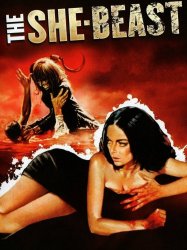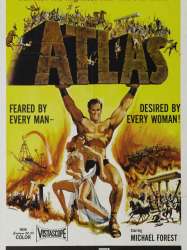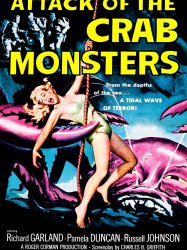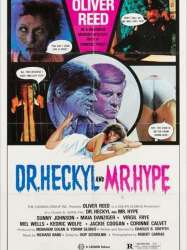Charles B. Griffith is a Actor, Director, Scriptwriter, Associate Producer and Second Unit Director American born on 23 september 1930 at Chicago (USA)

Charles Byron Griffith (September 23, 1930 – September 28, 2007) was a Chicago-born screenwriter, actor and film director, son of Donna Dameral, radio star of Myrt and Marge. along with Charles' grandmother, Myrtle Vail, and was best known for writing Roger Corman productions such as A Bucket of Blood (1959), The Little Shop of Horrors (1960), and Death Race 2000 (1975).
He was credited with 29 movies, but is known to have written many more. He had also directed at least six films, acted in six films, was second unit director in six films, produced three films and was production manager of two films.
With a career spanning decades, he is often cited as the father of American black comedy.
During the late fifties and early sixties, Griffith created both redneck classics such as Eat My Dust and black comedies such as A Bucket of Blood and The Little Shop of Horrors. He had a small role in It Conquered the World, which he also wrote, as Dr. Pete Shelton.
Griffith died on September 28, 2007 in San Diego, aged 77, from undisclosed causes.
Quentin Tarantino dedicated his film Deathproof to Griffith, whom he referred to as one of his main influences and called "the father of redneck cinema".
Griffith was born into a family of actors and performers: his mother and grandmother were actors, his father was in vaudeville and his grandfather was a circus performer. His mother died in childbirth in 1941, and Griffith was raised by his grandmother and attended military school.
He broke into the industry writing scripts for the radio serial, Myrt and Marge, in which his mother and grandmother had appeared as actors. He then worked on the TV adaptation on the serial which ended up not being filmed.
Meeting Roger Corman
Griffith began writing film scripts, which an actor friend of his, Jonathan Haze showed to Roger Corman, who hired Griffith as a writer. He wrote two Westerns for Corman that were not made (Three Bright Banners and Hangtown) before being hired to do an uncredited rewrite on It Conquered the World (Griffith says he asked to take his name off). He received his debut credit with Gunslinger (1955).
"I got into the habit of writing very quickly without realising it and, because I was raised in a radio family, I didn't know that you were supposed to take a long time to write a film script," said Griffith.
For the next six years Griffith was Corman's most regular screenwriter. He wrote several of his early scripts with a partner, Mark Hanna, although Griffith later claimed that he did most of the writing while Hanna did the selling.
Columbia Films
Following his success with Corman, Columbia Pictures signed Griffith to a five-picture contract as producer and director. Griffith:
They told me to make a list of 100 titles to see if I could do it. Once I did that, they picked out two that would send me on a distant location in Hawaii because they knew I couldn’t make a picture out of the promised budgets: $85,000/black and white and $90,000/color. I really don’t want to get into the Columbia pictures because they thought I was putting them on. Roger thought I told them that I taught him everything he knew, whereas it was actually the other way around.
Griffith made two films for Columbia, directing one, but did not enjoy the experience:
They were really terrible. It stopped me for twenty years from ever directing again. They were really rank. You see, I got chicken and started to write very safely within a formula to please the major studios, and of course, you can't do that.
Reuniting with Corman
Griffith soon returned to Corman and wrote two script for him made in North Dakota, Beast from Haunted Cave (1958), Ski Troop Attack (1959). He says for Beast from Haunted Cave he reused the structure he developed for Naked Paradise (1957). (He would subsequently use this structure on Creature from the Haunted Sea (1961) and Atlas (1962).}
After the North Dakota movies he persuade Corman to make a black comedy and wrote A Bucket of Blood. He later re-used the structure for his most famous script, The Little Shop of Horrors (1960). "That’s the most precious thing you can find is a new structure," he said later. Griffith was paid just $800 for his work.
Griffith says he was hurt that Roger Corman elected Richard Matheson to write House of Usher (1960), which was made in colour and for a considerably larger budget than Corman and Griffith were used to:
He [Corman] said that Matheson had a reputation. They were going to go with color and CinemaScope. It was irritating because I saw that he was making a value judgement based on how much people were making and he was the one making policy. He said that no screenwriter who gets lets than fifty thousand a script was any good.
Years overseas
In 1960 Griffith produced an Arab-Israeli war film with regular collaborator Mel Welles but they were picketed by unions and had to shut down. Griffith and Melles sued the union and settled out of court. Griffith moved to Israel to finish the movie but was unable to. He wound up living there for two years, writing a couple of films before Corman rehired him to work on the crew of The Young Racers (1963).
Griffith spent the next few years in Europe, working for Roger Corman and also with Michael Reeves before moving back to Hollywood. He worked for Corman sporadically until the late 1980s, as a writer, director and second unit director.
"I was lazy," he admitted later. "Instead of trying to write an A-picture and sell it on the market, I'd just go back and get another assignment from Roger."
His best known credit from this time as Death Race 2000 which Griffith was called in to rewrite for producer Corman and director Paul Bartel. Griffith:
Corman tried to make it serious. He was enraged with me for trying to make it funny, but he took me to see the cars and they were all goofy looking with decal eyes and rubber teeth. I said, 'You can't be serious,' and he tells me, 'Chuck, this is a hard-hitting serious picture!' Obviously, Bartel didn't think so either.
Later years
From the 1980s onwards Griffith concentrated on writing books and travelling as opposed to writing screenplays.
In 1982 a stage adaptation of Little Shop of Horrors premiered and went on to enjoy great success, with many productions all over the world. The producers secured the rights from Roger Corman but Griffith was originally not part of the arrangement. Griffith, sued the makers of the musical, and wound up being granted "one-fourth of one percent" of the takings as a royalty. "It has kept me going since 1983" said Griffith in the late 1990s - although in 1999 he was claiming the deal had lapsed.
Source : Wikidata
Charles B. Griffith

- Infos
- Photos
- Best films
- Family
- Characters
- Awards
Birth name Charles Byron Griffith
Nationality USA
Birth 23 september 1930 at Chicago (USA)
Death 28 september 2007 (at 77 years) at San Diego (USA)
Nationality USA
Birth 23 september 1930 at Chicago (USA)
Death 28 september 2007 (at 77 years) at San Diego (USA)
Charles Byron Griffith (September 23, 1930 – September 28, 2007) was a Chicago-born screenwriter, actor and film director, son of Donna Dameral, radio star of Myrt and Marge. along with Charles' grandmother, Myrtle Vail, and was best known for writing Roger Corman productions such as A Bucket of Blood (1959), The Little Shop of Horrors (1960), and Death Race 2000 (1975).
He was credited with 29 movies, but is known to have written many more. He had also directed at least six films, acted in six films, was second unit director in six films, produced three films and was production manager of two films.
With a career spanning decades, he is often cited as the father of American black comedy.
During the late fifties and early sixties, Griffith created both redneck classics such as Eat My Dust and black comedies such as A Bucket of Blood and The Little Shop of Horrors. He had a small role in It Conquered the World, which he also wrote, as Dr. Pete Shelton.
Griffith died on September 28, 2007 in San Diego, aged 77, from undisclosed causes.
Quentin Tarantino dedicated his film Deathproof to Griffith, whom he referred to as one of his main influences and called "the father of redneck cinema".
Biography
Early lifeGriffith was born into a family of actors and performers: his mother and grandmother were actors, his father was in vaudeville and his grandfather was a circus performer. His mother died in childbirth in 1941, and Griffith was raised by his grandmother and attended military school.
He broke into the industry writing scripts for the radio serial, Myrt and Marge, in which his mother and grandmother had appeared as actors. He then worked on the TV adaptation on the serial which ended up not being filmed.
Meeting Roger Corman
Griffith began writing film scripts, which an actor friend of his, Jonathan Haze showed to Roger Corman, who hired Griffith as a writer. He wrote two Westerns for Corman that were not made (Three Bright Banners and Hangtown) before being hired to do an uncredited rewrite on It Conquered the World (Griffith says he asked to take his name off). He received his debut credit with Gunslinger (1955).
"I got into the habit of writing very quickly without realising it and, because I was raised in a radio family, I didn't know that you were supposed to take a long time to write a film script," said Griffith.
For the next six years Griffith was Corman's most regular screenwriter. He wrote several of his early scripts with a partner, Mark Hanna, although Griffith later claimed that he did most of the writing while Hanna did the selling.
Columbia Films
Following his success with Corman, Columbia Pictures signed Griffith to a five-picture contract as producer and director. Griffith:
They told me to make a list of 100 titles to see if I could do it. Once I did that, they picked out two that would send me on a distant location in Hawaii because they knew I couldn’t make a picture out of the promised budgets: $85,000/black and white and $90,000/color. I really don’t want to get into the Columbia pictures because they thought I was putting them on. Roger thought I told them that I taught him everything he knew, whereas it was actually the other way around.
Griffith made two films for Columbia, directing one, but did not enjoy the experience:
They were really terrible. It stopped me for twenty years from ever directing again. They were really rank. You see, I got chicken and started to write very safely within a formula to please the major studios, and of course, you can't do that.
Reuniting with Corman
Griffith soon returned to Corman and wrote two script for him made in North Dakota, Beast from Haunted Cave (1958), Ski Troop Attack (1959). He says for Beast from Haunted Cave he reused the structure he developed for Naked Paradise (1957). (He would subsequently use this structure on Creature from the Haunted Sea (1961) and Atlas (1962).}
After the North Dakota movies he persuade Corman to make a black comedy and wrote A Bucket of Blood. He later re-used the structure for his most famous script, The Little Shop of Horrors (1960). "That’s the most precious thing you can find is a new structure," he said later. Griffith was paid just $800 for his work.
Griffith says he was hurt that Roger Corman elected Richard Matheson to write House of Usher (1960), which was made in colour and for a considerably larger budget than Corman and Griffith were used to:
He [Corman] said that Matheson had a reputation. They were going to go with color and CinemaScope. It was irritating because I saw that he was making a value judgement based on how much people were making and he was the one making policy. He said that no screenwriter who gets lets than fifty thousand a script was any good.
Years overseas
In 1960 Griffith produced an Arab-Israeli war film with regular collaborator Mel Welles but they were picketed by unions and had to shut down. Griffith and Melles sued the union and settled out of court. Griffith moved to Israel to finish the movie but was unable to. He wound up living there for two years, writing a couple of films before Corman rehired him to work on the crew of The Young Racers (1963).
Griffith spent the next few years in Europe, working for Roger Corman and also with Michael Reeves before moving back to Hollywood. He worked for Corman sporadically until the late 1980s, as a writer, director and second unit director.
"I was lazy," he admitted later. "Instead of trying to write an A-picture and sell it on the market, I'd just go back and get another assignment from Roger."
His best known credit from this time as Death Race 2000 which Griffith was called in to rewrite for producer Corman and director Paul Bartel. Griffith:
Corman tried to make it serious. He was enraged with me for trying to make it funny, but he took me to see the cars and they were all goofy looking with decal eyes and rubber teeth. I said, 'You can't be serious,' and he tells me, 'Chuck, this is a hard-hitting serious picture!' Obviously, Bartel didn't think so either.
Later years
From the 1980s onwards Griffith concentrated on writing books and travelling as opposed to writing screenplays.
In 1982 a stage adaptation of Little Shop of Horrors premiered and went on to enjoy great success, with many productions all over the world. The producers secured the rights from Roger Corman but Griffith was originally not part of the arrangement. Griffith, sued the makers of the musical, and wound up being granted "one-fourth of one percent" of the takings as a royalty. "It has kept me going since 1983" said Griffith in the late 1990s - although in 1999 he was claiming the deal had lapsed.
Best films
Usually with
Filmography of Charles B. Griffith (34 films)
Actor

Eating Raoul (1982)
, 1h23Directed by Paul Bartel
Origin USA
Genres Comedy, Horror comedy, Horror, Crime
Themes Films about sexuality, Erotic films, BDSM in films, Films about prostitution, Serial killer films, Comedy horror films, Erotic thriller films, Children's films
Actors Mary Woronov, Robert Beltran, Paul Bartel, Ed Begley Jr., Buck Henry, Edie McClurg
Roles (uncredited)
Rating67%





Paul and Mary Bland are a wine dealer and a nurse, respectively, who bemoan their low status in life and dream of opening a restaurant. An exceptionally prudish couple, they sleep in separate beds and disapprove of sex, except for "a little hugging and kissing". After Paul is fired from his job at a wine shop, the couple are left relatively penniless and the chances that they will ever realize their dream quickly diminish. Their plight is exacerbated by the fact that they live in an apartment building that is a regular site of swinger parties.

Smokey Bites the Dust (1981)
Directed by Charles B. Griffith
Origin USA
Genres Comedy, Action, Romance
Actors Jimmy McNichol, Janet Julian, William Forsythe, Rance Howard, Mel Welles, Michael Greene
Roles Mellow Rabbi (uncredited)
Rating35%





The stock plot deals with Roscoe Wilton (Jimmy McNichol), a teenage joyriding car thief, evading Cyco (psycho) County Sheriff Turner (Walter Barnes) and his unintelligent deputies.

Hollywood Boulevard (1976)
, 1h23Directed by Joe Dante, Allan Arkush
Origin USA
Genres Thriller, Comedy
Actors Mary Woronov, Jeffrey Kramer, Dick Miller, Paul Bartel, Jonathan Kaplan, Joseph McBride
Roles Mark Dentine
Rating58%





In a prologue, pompous film director Eric Von Leppe (Paul Bartel) is shooting a skydiving sequence for low-budget Miracle Pictures in which an actress is killed. Candy Wednesday (Candice Rialson) arrives in Los Angeles to make it as an actor. She gets an agent, Walter Paisley (Dick Miller), but struggles to find work until she inadvertently gets involved in a bank robbery as a getaway driver. This gets her a job for Miracle Pictures as a stunt driver. She meets Eric Von Leppe, temperamental starlet Mary McQueen (Mary Woronov), sleazy producer PG (Roger Doran) and friendly scriptwriter, Pat (Jeffrey Kramer). Candy and Pat fall in love and she starts to get work as an actor, becoming friends with fellow starlets Bobbi (Rita George) and Jill (Tara Strohmeier).

Death Race 2000 (1975)
, 1h24Directed by Charles B. Griffith, Paul Bartel, Lewis Teague
Origin USA
Genres Science fiction, Comedy, Action
Themes Sports films, Films about television, Transport films, Films about automobiles, Films set in the future, Auto racing films, La téléréalité, Political films, Road movies, Dystopian films
Actors David Carradine, Simone Griffeth McDonald, Sylvester Stallone, Louisa Moritz, Martin Kove, John Landis
Roles Resistance Army Member (uncredited)
Rating61%





In 2000, during the 20th annual race, a resistance group led by Thomasina Paine (Harriet Medin), a descendant of 1770s American Revolutionary Thomas Paine, plans to rebel against Mr. President's regime by sabotaging the race, killing most of the drivers, and taking Frankenstein hostage as leverage against the President. The group is assisted by Paine's great granddaughter Annie (Simone Griffeth), Frankenstein's latest navigator. She plans to lure him into an ambush to be replaced by a double. Despite a pirated national broadcast made by Ms. Paine herself, the resistance's disruption of the race is covered up by the government and instead blamed on the French, who are also blamed for ruining the country's economy and telephone system. The game has sadistic rules, where killing a baby and physically challenged people will give the player extra points. Machine Gun Joe (Sylvester Stallone) is the main opposition to Frankenstein.

The She Beast (1966)
, 1h19Genres Thriller, Comedy, Horror
Actors Barbara Steele, Ian Ogilvy, Mel Welles, John Karlsen, Charles B. Griffith
Roles Policeman (uncredited)
Rating47%





A young woman (Barbara Steele) is driving alongside a lake. She has an accident and the car plunges into the water. Her body is then possessed by the spirit of an 18th-century witch who was killed by local villagers, and is bent on avenging herself on them.

Atlas (1961)
, 1h19Directed by Roger Corman
Origin USA
Genres Science fiction, War, Fantasy, Action, Adventure, Peplum
Themes Films based on mythology, Films based on Greco-Roman mythology, Dans la Grèce mythologique, Films based on Greco-Roman mythology
Actors Michael Forest, Frank Wolff, Roger Corman, Dick Miller, Charles B. Griffith, Walter Maslow
Roles Greek soldier (uncredited)
Rating39%





The hero Atlas fights against the evil king Proximates.

The Little Shop of Horrors (1960)
, 1h10Directed by Roger Corman
Origin USA
Genres Science fiction, Comedy, Fantasy, Horror
Themes Comedy horror films, Mise en scène d'une plante
Actors Jonathan Haze, Jackie Joseph, Mel Welles, Dick Miller, Jack Nicholson, Karyn Kupcinet
Roles Screaming Patient/ Audrey Junior (voice) / Burglar (uncredited)
Rating62%





On Los Angeles's skid row, penny-pinching Gravis Mushnick (Mel Welles) owns a florist shop which is staffed by him and his two employees, the sweet but simple Audrey Fulquard (Jackie Joseph) and clumsy Seymour Krelboyne (Jonathan Haze). Although the rundown shop gets little business, there are some repeat customers; for instance, Mrs. Siddie Shiva (Leola Wendorff) shops almost daily for flower arrangements for her many relatives' funerals. Another regular customer is Burson Fouch (Dick Miller), who eats the plants he buys for lunch. When Seymour fouls up the arrangement of Dr. Farb (John Shaner), a sadistic dentist, Mushnick fires him. Hoping Mushnick will change his mind, Seymour tells him about a special plant that he crossbred from a butterwort and a Venus flytrap. Bashfully, Seymour admits that he named the plant "Audrey Jr.", a revelation that delights the real Audrey.

Attack of the Crab Monsters (1957)
, 1h2Directed by Roger Corman
Origin USA
Genres Science fiction, Horror
Themes Films about magic and magicians, Seafaring films, Transport films, Giant monster films, Disaster films
Actors Pamela Duncan, Russell Johnson, Mel Welles, Charles B. Griffith, Ed Nelson
Roles Seaman Mac, wears sunglasses
Rating49%





A group of scientists land on a remote island in the Pacific Ocean to search for the previous expedition that disappeared without a trace and to continue their research on the effects of radiation from the Bikini Atoll nuclear tests on the island's plant and sea life. They learn to their horror that the earlier group have been killed and eaten by two mutated, intelligent giant crabs, who have also absorbed the minds of their victims and can speak telepathically in the voices of their victims.

It Conquered the World (1956)
, 1h11Directed by Roger Corman
Origin USA
Genres Science fiction, Thriller, Horror
Themes Space adventure films, Films about music and musicians, Films set in the future, Films about extraterrestrial life, Musical films, Space opera, Venus in film, Films about extraterrestrial life, Alien invasions in films, Disaster films
Actors Peter Graves, Lee Van Cleef, Dick Miller, Beverly Garland, Jonathan Haze, Thomas E. Jackson
Roles Dr. Pete Shelton
Rating49%





Dr. Tom Anderson (Lee Van Cleef), an embittered scientist, has made contact with Zontar, a Venusian creature, while using his radio transmitter. The alien's secret motivation is to take complete control of the Earth by enslaving humanity using mind control devices; the alien claims it only wants to bring peace to our troubled world by eliminating all emotions. Anderson agrees to help the creature and even intends to allow it to assimilate his wife (Beverly Garland) and friend Dr. Nelson (Peter Graves).
Director

Directed by Charles B. Griffith
Origin USA
Genres Fantasy, Action
Actors Mel Welles, David Carradine, Robert Jayne, Lana Clarkson, Susan Lee Hoffman, Sid Haig
Rating21%






Smokey Bites the Dust (1981)
Directed by Charles B. Griffith
Origin USA
Genres Comedy, Action, Romance
Actors Jimmy McNichol, Janet Julian, William Forsythe, Rance Howard, Mel Welles, Michael Greene
Rating35%





The stock plot deals with Roscoe Wilton (Jimmy McNichol), a teenage joyriding car thief, evading Cyco (psycho) County Sheriff Turner (Walter Barnes) and his unintelligent deputies.

Dr. Heckyl and Mr. Hype (1980)
Directed by Charles B. Griffith
Origin USA
Genres Comedy, Fantasy, Horror
Actors Oliver Reed, Sunny Johnson, Virgil Frye, Mel Welles, Corinne Calvet, Dick Miller
Rating40%





The film is a reversal of the Dr. Jekyll and Mr. Hyde story, about a malformed doctor who drinks a potion and becomes a handsome (and violent) ladies man.

Up from the Depths (1979)
, 1h15Directed by Charles B. Griffith
Origin USA
Genres Horror
Actors Sam Bottoms, Virgil Frye, R. Lee Ermey, Ken Metcalfe
Rating33%





The staff and vacationers at a first-class resort on the island of Maui are beginning to mysteriously disappear. A biologist believes that an underwater earthquake has caused a giant and very hungry dormant prehistoric fish to be released from his slumber. Voraciously the fish helps himself to a tourist buffet. Now it's open season for the local fishermen to find the creature and kill it.

Eat My Dust (1976)
, 1h30Directed by Charles B. Griffith, Barbara Peeters
Origin USA
Genres Comedy, Action
Themes Transport films, Films about automobiles, Road movies
Actors Ron Howard, Dave Madden, Christopher Norris, Brad Davis, Clint Howard, Rance Howard
Rating54%





Le jeune Hoover Niebold a une passion pour les voitures. Pour épater et séduire Darlene, une jolie lycéenne, il l'invite à partir en balade dans un bolide subtilisé au pilote professionnel « Big » Bubba Jones. Son shérif de père Harry Niebold ordonne à ses adjoints de le rattraper, sans succès. L'aspirant-pilote n'en continue pas moins de vrombir sur les routes et de perturber les habitants du coin. Devant le tollé général, le shérif est contraint de partir lui-même, escorté du pilote et de son équipe, à la poursuite de son chenapan de fils.

Death Race 2000 (1975)
, 1h24Directed by Charles B. Griffith, Paul Bartel, Lewis Teague
Origin USA
Genres Science fiction, Comedy, Action
Themes Sports films, Films about television, Transport films, Films about automobiles, Films set in the future, Auto racing films, La téléréalité, Political films, Road movies, Dystopian films
Actors David Carradine, Simone Griffeth McDonald, Sylvester Stallone, Louisa Moritz, Martin Kove, John Landis
Rating61%





In 2000, during the 20th annual race, a resistance group led by Thomasina Paine (Harriet Medin), a descendant of 1770s American Revolutionary Thomas Paine, plans to rebel against Mr. President's regime by sabotaging the race, killing most of the drivers, and taking Frankenstein hostage as leverage against the President. The group is assisted by Paine's great granddaughter Annie (Simone Griffeth), Frankenstein's latest navigator. She plans to lure him into an ambush to be replaced by a double. Despite a pirated national broadcast made by Ms. Paine herself, the resistance's disruption of the race is covered up by the government and instead blamed on the French, who are also blamed for ruining the country's economy and telephone system. The game has sadistic rules, where killing a baby and physically challenged people will give the player extra points. Machine Gun Joe (Sylvester Stallone) is the main opposition to Frankenstein.
 Connection
Connection




